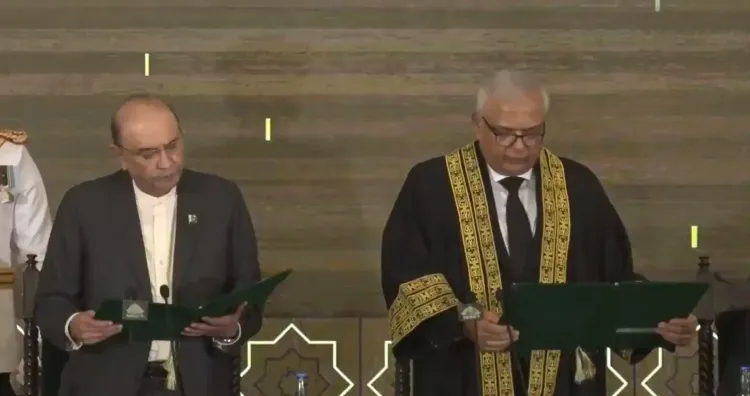What Does the Swearing in of Pakistan's First Chief Justice of Federal Constitutional Court Mean After the Controversial Constitutional Amendment?

Synopsis
Key Takeaways
- Justice Aminuddin Khan sworn in as Chief Justice of the FCC.
- 27th Constitutional Amendment aims to reform the judiciary.
- The FCC will help manage the Supreme Court's backlog.
- Six judges were appointed to the FCC.
- Opposition plans to protest against the amendment.
Islamabad, Nov 14 (NationPress) Justice Aminuddin Khan was sworn in as the inaugural Chief Justice of Pakistan's newly-formed Federal Constitutional Court (FCC) on Friday, following President Asif Ali Zardari's endorsement of the 27th Constitutional Amendment Bill into law.
President Zardari officiated the oath-taking ceremony for Justice Khan at Aiwan e Sadr, the official residence of the President of Pakistan. The event was attended by Prime Minister Shehbaz Sharif, Army Chief Field Marshal Asim Munir, Chairman Joint Chiefs of Staff Committee (CJCSC) General Sahir Shamshad Mirza, and Supreme Court Chief Justice Yahya Afridi.
Justice Khan's selection was made by Zardari on Thursday in accordance with Clause 3 of Article 175A, in conjunction with Article 175C of the Constitution, taking effect from the date of Justice Aminuddin’s oath-taking, as reported by Pakistan's leading daily Dawn.
The initiative to establish the FCC is part of judicial reforms included in the 27th Constitutional Amendment. Government officials noted that the FCC aims to alleviate the Supreme Court's burden and ensure the timely resolution of constitutional cases while enhancing judicial independence and credibility.
Zardari appointed six judges to the FCC - Justice Syed Hasan Azhar Rizvi, Justice Aamer Farooq, Justice Ali Baqar Najafi from the Supreme Court, Justice KK Agha from the Sindh High Court, Balochistan High Court Chief Justice Rozi Khan Barrech, and Justice (retd) Arshad Hussain Shah.
The Senate of Pakistan passed the 27th Constitutional Amendment bill on Thursday after a second voting round amidst opposition protests. The amendment's clauses had previously received approval with a two-thirds majority.
This legislation, which consists of 56 clauses, was initially approved by the National Assembly on Wednesday and presented in the Senate in the same format. Members of JUI-F were present in the House, while defected senators Saifullah Abro and Ahmad Khan from PTI and JUI-F participated in the session to cast their votes, according to Pakistan-based The Express Tribune.
The bill was first introduced in the Senate for voting on Monday and passed the same day. It was subsequently sent to the National Assembly, which passed it on Wednesday with amendments. The modified legislation was then presented again in the Senate on Thursday for consideration.
Concurrently, the opposition alliance announced plans to initiate a political movement against the 27th Constitutional Amendment starting Friday, aiming to restore the judiciary's power and the chief justice's authority that they believe have been undermined by this amendment, as reported by The Express Tribune.
PTI chairman Barrister Gohar Ali Khan stated, "The office of the Chief Justice has been abolished — we will restore it." He emphasized, "We will restore the dignity and powers of the judiciary," adding that while judicial reforms may be necessary, the government’s current stance toward judges is “unacceptable.”
Chairman of the Pashtunkhwa Milli Awami Party Mahmood Khan Achakzai announced that the opposition would commence protests later on Friday, asserting that the movement would remain peaceful and aimed at restoring the mandate of the people, which he claimed had been "stolen."










